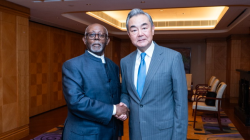Wang Yi and International Officials Spotlight IOMed's Crucial Role in Resolving Disputes
Chinese Foreign Minister Wang Yi inks new international mediation pact during high-level meetings in Hong Kong.

Diplomatic activity was in full swing on Friday as Chinese Foreign Minister Wang Yi met with a series of foreign dignitaries in Hong Kong, coinciding with the high-profile signing ceremony of the Convention on the Establishment of the International Organization for Mediation (IOMed). The event drew senior officials from Africa, South Asia, Europe, and Southeast Asia, signaling wide-ranging international interest in the newly formed body.
Wang Yi, who serves not only as Foreign Minister but also as a member of the Political Bureau of the Communist Party of China Central Committee, held individual discussions with counterparts from Zimbabwe, Benin, Switzerland, Pakistan, Cameroon, Mauritania, Nepal, and Laos. During these meetings, he emphasized that the IOMed reflects the shared aspirations of developing nations, offering an innovative avenue for resolving disputes through dialogue and consultation rather than confrontation.
Highlighting the significance of the IOMed, Wang described it as the world’s first intergovernmental international legal organization dedicated to mediation. He noted that the establishment of the organization would further enhance the international rule of law and encourage fairer, more stable global governance. "This initiative upholds the values enshrined in the UN Charter and answers the pressing calls of the Global South, especially small- and medium-sized countries, seeking peaceful means of settling their differences," Wang asserted.
The feedback from attending foreign diplomats was overwhelmingly supportive. Beninese Foreign Minister Olushegun Adjadi Bakari committed to fast-tracking his country’s ratification of the convention, recognizing the potential of the IOMed to bolster global stability—a development of particular interest across the African continent. Pakistani Deputy Prime Minister and Foreign Minister Mohammad Ishaq Dar celebrated China's leadership in launching the IOMed, describing its timing as "crucial" for reinforcing the multilateral system. He also announced that Pakistan had accepted China’s mediation initiative and would soon upgrade its diplomatic relations with Afghanistan by appointing a new ambassador.
Swiss Federal Councilor Ignazio Cassis welcomed the IOMed as a fresh chapter in cooperation between Switzerland and China, observing that the organization marks a significant step toward resolving disputes by peaceful means. Nepal’s Foreign Minister Arzu Rana Deuba also praised the choice of Hong Kong as the headquarters for the IOMed, underlining the city's strategic position as a bridge between East and West.
Lao Deputy Prime Minister Saleumxay Kommasith remarked that the preference for mediation aligns closely with Asian cultural values, adding that the mechanism would likely encourage many other countries to join and contribute to peace and security in the region. Across the board, delegates expressed hope that the IOMed would become a cornerstone for multilateralism, justice, and international cooperation in an increasingly complex world.




